Perspective: What is the appropriate response to people who said terrible things after Trump was shot?

- Oops!Something went wrong.Please try again later.
Broadly speaking, there were two potential responses to the horrifying attempted assassination of former President Donald Trump, an event which had enormous potential to spiral out of control.
One response is to blame “the other side” and double down on efforts to defeat your political enemy. The other is to unequivocally condemn the violence, take a hard look at ourselves and to try mitigate tensions in our polarized age. The first is easy and counterproductive. The second is hard and requires real leadership. America desperately needs the latter, and there are promising signs in much of the response.
Unfortunately, there were also despicable responses on both sides of the political aisle, some of the worst coming from the left.
Jacqueline Marsaw, who last week was an aide to Rep. Bennie Thompson, D-Miss., was fired by her boss after she posted on Facebook, “I don’t condone violence but please get you some shooting lessons so you don’t miss next time” and later saying, “That’s what your hate speech got you!!”
This unfortunate event has a lot to teach America.

Thompson, who appropriately condemned the violence without qualification, was right to fire Marsaw. First, it is never appropriate to cheer political assassinations, no matter how much you disagree with the intended victim. Second, doing so is even worse for someone like Marsaw, who should have known that what she says reflects on her boss. Thompson is not only a senior member of Congress but the ranking member of the House Homeland Security Committee, as well as the former chairman of the House Select Committee on the Jan. 6 Capitol Attack. He can least afford to be affiliated with comments like this.
We don’t fully know the motives of the shooter, but we do know that the assassination attempt comes in a time of hyperpolarization unique to modern times. There is no way to reduce such tensions without leaders taking direct action within their zones of control, to encourage and even mandate better behavior.
In that sense, Thompson firing Marsaw is an act of civic hygiene. The First Amendment gives us an almost unlimited ability to say what we want, but it should not shield us from all consequences for our actions, particularly when you report to a person in a position of power and influence like Thompson.
But more must be considered. I can’t help but worry about Marsaw, and people like her. I don’t know her personally, but indications are that, aside from a few wrongheaded social media posts, she’s a normal, and even admirable person. She’s 61 years old, seems to have started working with Thompson early last year, and has served as the chairperson of the local chapter of the NAACP and an organizer for other civil rights organizations. Her work includes arranging parades for Martin Luther King Day in the heart of a state where, within her lifetime, civil rights activists were murdered for trying to register Black people to vote. Marsaw also organized a group for grieving parents whose children had died, after discovering how many mourning parents there were in her community after a “Stop the Violence” march she also organized.
You don’t have to agree with her politics to find something admirable in Marsaw’s life work.
It is easy to see the hypocrisy in organizing marches celebrating Martin Luther King, the patron saint of nonviolent activism in America, and organizing “Stop the Violence” campaigns, while making the kind of statement she did. But that’s the point: Her statement is not emblematic of her whole life. Marsaw has admitted, “I got overwhelmed in the moment” and said it was intended to be comic, and not serious. That does not excuse the remark, but she’s not the first person to say something terrible on social media without thinking it through.
The Libs of TikTok account on the social media platform X has been calling out a number of people who have said similar things and advocating for them to be fired. Marsaw, as a staffer for a congressional leader, was in a very different position than, say, a lab assistant at a medical facility. Maybe some of these people should be disciplined in various ways, maybe not. It depends on the details.
But we should think twice about ruining people’s lives over a few unwise social media posts. This is true, both for the sake of the individuals, as well as society as a whole.
While such statements are indeed moral failings, they do not occur in a vacuum, but are instead byproducts of our society’s toxic polarization. Indeed, much of the partisan warfare we have seen in recent years encourages this kind of response, especially on social media.
Saying this in no way justifies any of the despicable comments, but is to show that we should hold people accountable but be careful in our response. What will Marsaw, or those in her “tribe” learn if their entire lives are destroyed by a social media post? It’ll teach them they can only trust their own bubble.
In times like this, everyone should take the difficult but necessary step to hold people accountable, but also to show sufficient grace. There is no substitute to recognizing that we are all Americans, and we are all products of our own bubbles, and that we can only fix what is inside our own bubbles. When my fellow American, Jacqueline Marsaw, has her next job interview, I hope her prospective employer grills her about lessons learned from this unfortunate episode, and, should her answer be sufficient and her skills a good match, give her the job.
It is in small things like that that America can slowly change for the better.
Cliff Smith is a lawyer and a former congressional staffer. He lives in Washington, D.C., where he works on national security related issues. His views are his own.

